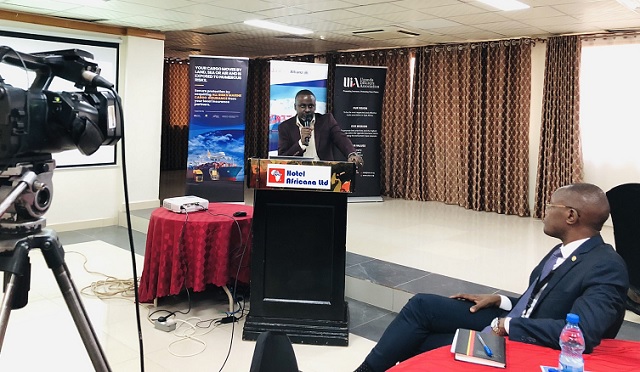
Kampala, Uganda | THE INDEPENDENT | The oil and gas companies snubbed Uganda’s insurance industry when importing drilling equipment, which would have raised premiums worth more than one trillion shillings, according to a claim.
Specifically, they point at the four drilling rigs that have so far been shipped into the country, but that they did not abide by the Compulsory Local Purchase of Marine Insurance as provided for in the Insurance Act.
The Uganda Clearing Industry and Forwarding Association, UCIFA, claims that each rig was worth 90 million US dollars in insurance and this would have given the local industry big business.
UCIFA Chairman Jaffer Abdallah Farjallah told the media in Kampala that the law does not even compel insuring refined petroleum imports with local insurance companies. He accuses the government agencies of targeting what he calls smaller players and yet their businesses account for a very small part of total insurance premiums.
The regulations on compulsory local marine insurance were made in 2017 but implementation faced challenges until last year when the Insurance Regulatory Authority announced that enforcement would start in June. This was aimed at ensuring that Uganda retains more money that is spent on insuring the imports, so as to grow the local industry.
But the move would also help the importers avoid some of the challenges encountered when insuring with foreign firms.
Edwin Lukandwa, the Business Development Manager at Jubilee Insurance, said for example, that insurance policies and contracts in China, currently the biggest source of imports for Uganda, are written in Chinese, which many Ugandans do not understand. He says that issues like ‘under-covering’ of cargo arise when the exporter pays for part of the cover and the Ugandan importer is informed that the cargo is covered 100 percent.
When such issues arise, it usually requires the importer to hire lawyers, and translators and even travel to China, spending even more.
According to him, it is cheaper to insure with Ugandan companies because, then, it would be easier to lodge a complaint and get answers.
Abdallah says that unfortunately, the law has taken too long to be implemented.
Currently, cargo that is expected to be insured locally is subjected to a fine of 1.5 percent of its value by Uganda Revenue Authority. But the UCIFA Chairman says that the country is losing a lot because if imports were compelled to pay local insurance of 0.5 percent, it would boost the sector and increase the taxes payable, more than the 1.5 percent surcharge.
Asked about the shortcomings especially regarding oil imports, Stephen Kaddu Mukasa, the Manager Inspections at IRA, admitted that there are still challenges because Marine Insurance is new in Uganda. He dismissed claims that all oil and gas equipment that have been shipped in have been insured with foreign companies.
This was also stated by the Petroleum Authority of Uganda, that local companies have had a share of the insurance business opportunities provided by the oil industry imports. However, according to them, there is some equipment that, by their nature, and where they originate from, and the kind of risk involved, they cannot be insured locally.
The total premium realized by Uganda’s insurance companies last year hit the one trillion-shilling mark, and if just one rig had been locally insured, it would have increased this by almost 30 percent.
The traders’ association, KACITA Uganda, says they are ready to embrace local purchase of marine insurance, and that it is the authorities that have delayed its enforcement.
Jemba Kanakulya Mulondo, a board member of Kacita and logistics operator, said the IRA should rally all agencies involved in the regulation of imports to ensure that the law is efficiently enforced. He suggests that the IRA engages authorities in China to reach a common position on marine insurance.
IRA’s Kaddu Mukasa says it is important to continue with sensitization of all sections of people involved before enforcement commences.
In January this year, URA and Uganda Investment Authority gave importers three months to start purchasing marine insurance locally or they would not be cleared by customs.
Ibrahim Bbosa, the Assistant Commissioner for Public and Corporate Affairs at URA, said, “the implementation of this directive will be done in a phased manner with a three-month grace period during which there will be no penalties.”
According to Bbosa, during the period, importers with marine insurance coverage from off-shore companies will be facilitated while those with no form of insurance are compelled to purchase the local insurance during this transitory period.
*****
URN
 The Independent Uganda: You get the Truth we Pay the Price
The Independent Uganda: You get the Truth we Pay the Price


